#Gandhi Seva Award criteria
Explore tagged Tumblr posts
Text
#EDUCATION AWARDS#HEALTHCARE AWARDS#REAL ESTATE AWARDS#ICONIC ACHIEVER AWARDS#INNOVATION AWARDS#BANK EXCELLENCE AWARDS#GANDHI SEVA SAMMAN#Gandhi Seva Award winners#Gandhi Seva Award eligibility#Gandhi Seva Award criteria#Past recipients of Gandhi Seva Award#Gandhi Seva Award nomination#Gandhi Seva Award ceremony
0 notes
Text
Padma Shri Awards: Ordinary people being recognised for their life’s work
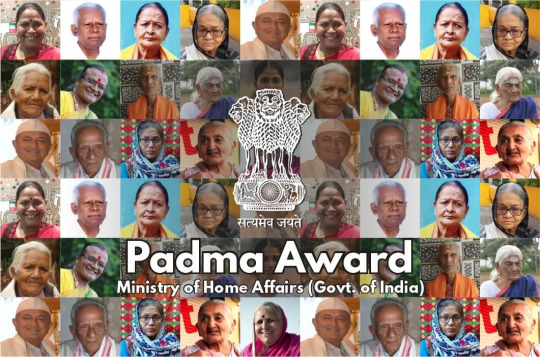
Padma Shri, also spelt Padma Shree, is one of the highest civilian awards of the Republic of India, after the Bharat Ratna. It is awarded by the Government of India every year on India's Republic Day. Padma Awards were established in 1954 to be awarded to citizens of India in honour of their distinguished contribution in various provinces of activity including the arts, education, industry, literature, science, sports, medicine, social service and public affairs. It has also been awarded to some outstanding individuals who were not citizens of India but did contribute in different ways to India.
The selection criteria have been scrutinised in some quarters with the claim that many highly worthy artists have been left out to favour certain individuals. India has now built an online nomination platform for the common citizens to recommend the nomination for the annually given civilian "Padma" awards. As of 2021, 3225 people have received the award. Among the Padma Awardees this year, some very ordinary people that have inspired us with their great accomplishments have made a positive change in society and have contributed to society. Here is a mention of a few of those. This list does not, in any manner, consider the achievements of others inferior.
Bhuri Bai
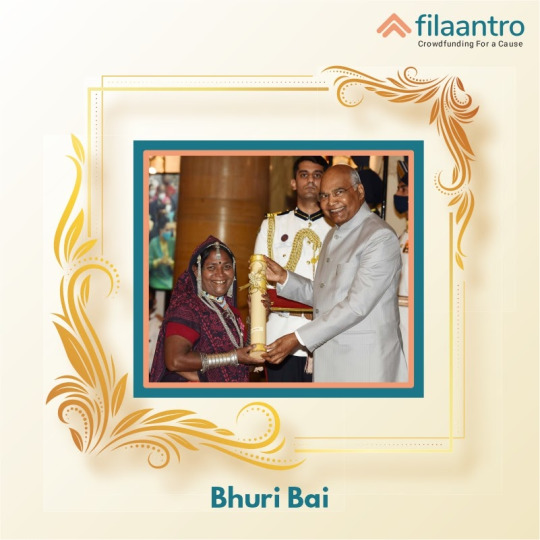
Bhuri Bai of Zher came to Bhopal twenty years ago. She works at Indira Gandhi Rashtriya Manav Sangrahalaya IGRMS on a daily wage basis. She has been painting with acrylic on canvas for the past nine years and has already authenticated herself as a Bhil contemporary artist. The walls of the Museum of Mankind are covered with Bhuri Bai’s paintings. As a child, she would go to the haat or local fair, an essential part of Bhill life, where the colours inspired her to paint. She paints the laugh and fun of the Gad Bapsi festival, where young men try to scale an oiled pole to get the coconuts tied to its top.
Asavadi Prakasarao
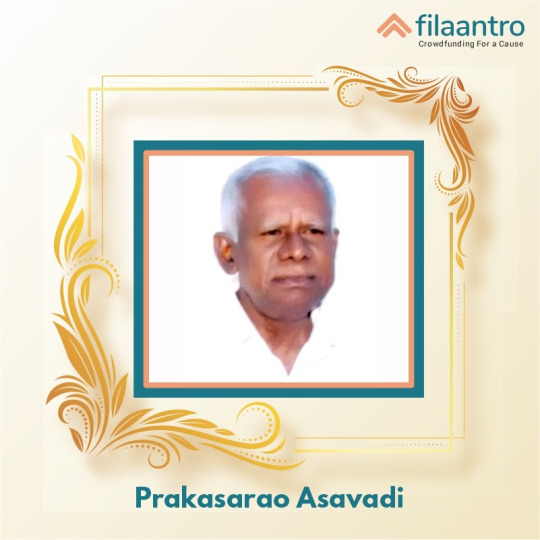
Dr Asavadi Prakasa Rao is a famous poet, Avadhani, writer, critic and translator besides being an academic, who had served as Principal of Govt. Degree Colleges; Member, Executive Committee, AP Sahitya Akademi; and Member, Executive Council, SK University. As Ashtavadhani, he gave 170 performances and has authored 50 books across various genres. And 18 books, including a doctoral thesis, have come out on his learned output. A distinguished orator, he took part in some radio/ TV programmes. He is also into social service. He has received several honours in his life work.
Gopiram Bargayan Burabhakat
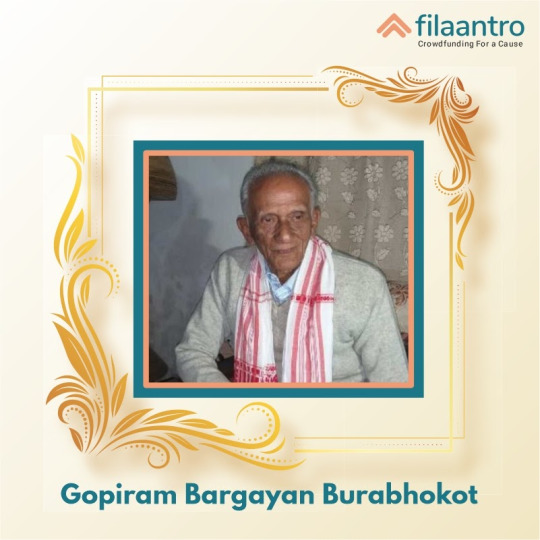
Veteran Assamese folk musician from Majuli, Shri Gopiram Bargayan Burabhakat will be conferred with Padma Shri this year. He is known for refining the Sattriya traditional music for over 7 decades.
He has been awarded the prestigious Padma Shri award for his contribution to Art.
Chutni Mahato
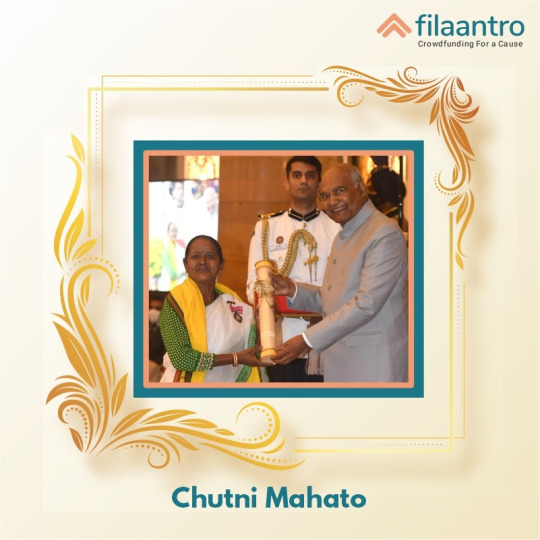
Chutni Mahato, also known as Chutni Devi (b. 1959), is a social worker from Jharkhand, India. Once a victim of witch-branding, she now strives to help others who have been branded as witches and spreads awareness about superstitions and witchcraft.
Mahato was born in Bholadih village, Jharkhand in 1959. Married off as a child, she was labelled a witch in 1995 after a family member fell ill. The villagers grabbed her property, ill-treated her including sexual abuse, forcing her to drink urine and being displayed semi-naked. She ran away, finding her way back to her parent's house.
An Indian Administrative Service officer connected her to social workers who were working in the area of prevention of witch-hunting. Following this, for over two decades, she has taken up the cause against superstitious practices and beliefs in Jharkhand.
Shanti Devi
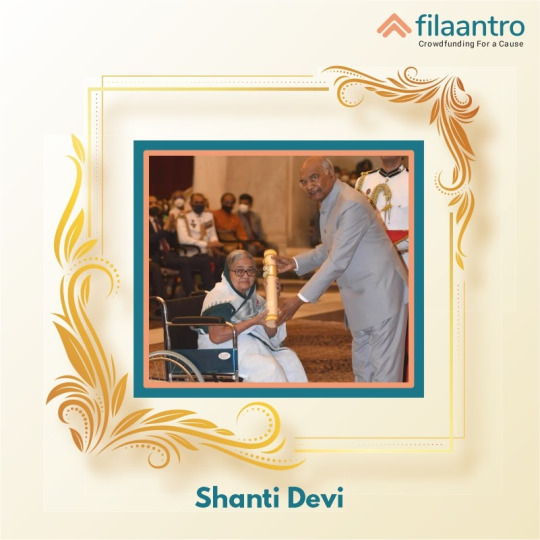
Shanti Devi is famous for her contribution towards restoring peace in the Maoist affected areas in Odisha. She leads the voluntary organisation Seva Samaj, who was born in the Balasore district on April 18, 1934. She got married at the age of 17 to Mahatma Gandhi follower Dr Ratan Das. After marriage, she shifted to Koraput from Balasore. Later, she founded an ashram at Gobarapalli in the Rayagada district. Her carrier in social work began from there. She worked for the growth and education of tribal girls. She also started multiple ashrams for the education, recovery and vocational training of orphans and destitute children. She wanted to make all girls self-sufficient so that they can live with self-respect in society.
Purnamasi Jani
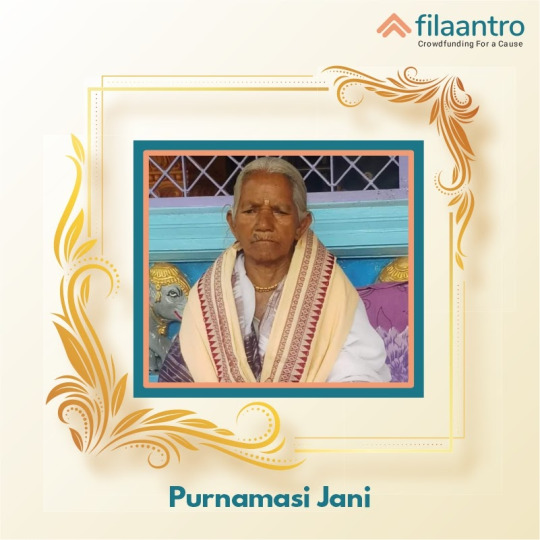
Purnamasi Jani, a Kui poet from Odisha. She is among the 5 Odias who have been recognised for their services. A tribal poet, Jani is popularly known as Tadi Sarubai in the region for her devotional songs and poems which she sings in the Kui dialect. In the last 40 years, Jani has written and sung thousands of devotional and folk songs. She has never been to school not does know how to read and write, other than reciting poems in the Kui dialect. Locals see her as a healer, whose songs are balm to the soul.
Manjamma Jogati
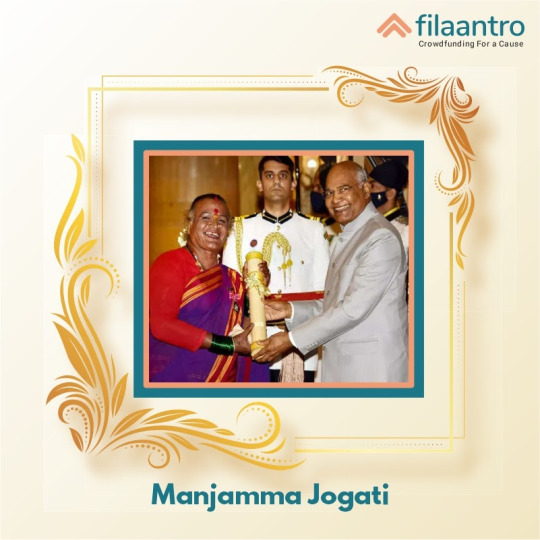
Manjamma Jogathi is an Indian Kannada theatre actress, singer and dancer of Jogathi Nritya, a folk dance form of North Karnataka. In 2019, she became the first transwoman to be the president of Karnataka Janapada Academy, a state top institution for folk arts. After leaving her house aged 15, she identified herself as a woman. Having completed education only till Class 10, she resorted to begging. During this time, she was sexually abused. Later, a father and son duo introduced her to dancing and took her to dance teacher Kallava Jogathi, where she learnt the Jogathi dance.
Manjamma became a permanent dancer in Kallavva's Jogathi dance group, performing in different parts of India.
Lajwanti

Patiala-based Phulkari artist Lajwanti (64), who has been doing the artwork since she was six. “My family brought the art to India while migrating from Multan, Pakistan, during Partition. I learnt it from my grandmother out of interest,” she said.
Pappammal
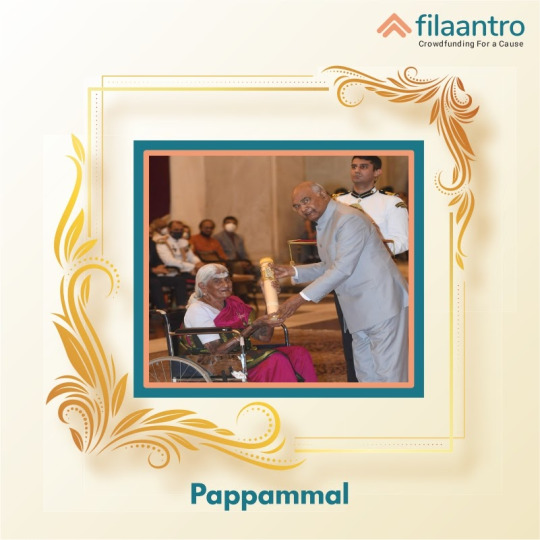
M. Pappammal alias Rangammal was born to Velammal and Maruthachala Mudaliar in the village of Devarayapuram in 1914. She lost her parents at a young age, and she and her two sisters were raised in Thekkampatti, Coimbatore by their paternal grandmother.
She is an organic farmer from Tamil Nadu, India. At the age of 105, she is argued to be the oldest farmer still active in the field. She is regarded as a pioneer in the agriculture field and is affiliated with Tamil Nadu Agricultural University's department of education. At her age, she works every day on her 2.5 acres of land.
Jaswantiben Jamnadas Popat
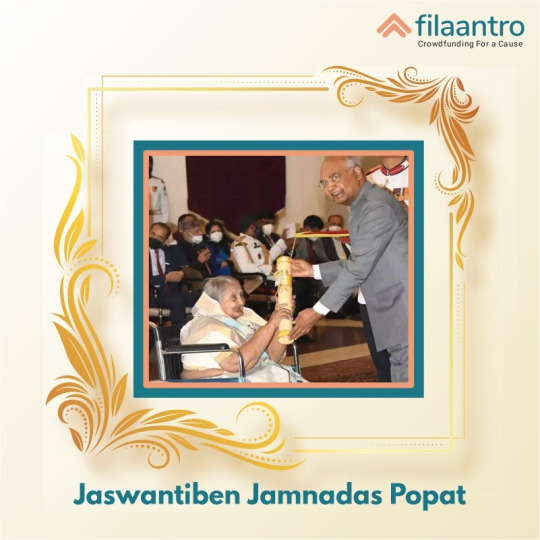
Jaswantiben Jamnadas Popat is an Indian businesswoman, who is one of the founders of Shri Mahila Griha Udyog Lijjat Papad, a women's worker cooperative involved in manufacturing various fast-moving consumer goods. She started the company with a seed capital of ?80 (US$1.10), their cooperative venture - the Shri Mahila Griha Udyog Lijjat Papad and now has a turnover of over ?1,600 crores (US$212 million). Her organization has employed nearly 45,000 women. While most people may not recognise her by name, it is unlikely that you are unfamiliar with her product. If you are someone who watched television during the 90s.
Nanda Prusty
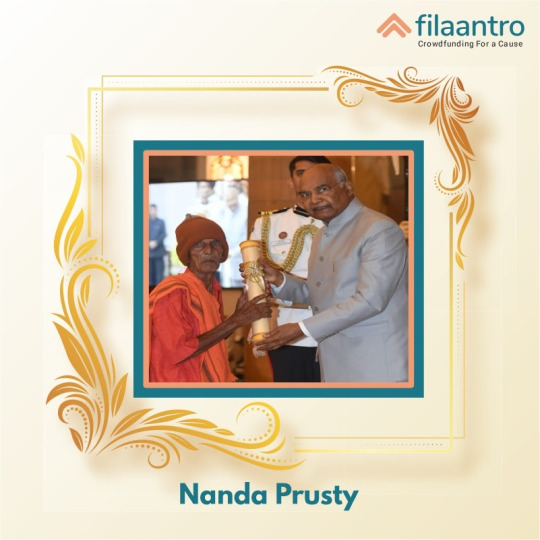
102-yr-old 'Nanda sir', who provided free education to children and adults at Jajpur, Odisha for decades, raised his hands in a gesture of blessing the President," the official account of the President's office tweeted while sharing photos from the awards ceremony, which took place Monday at the Rashtrapati Bhavan. Fondly known as 'Nanda Sir', he has spent several decades of his life providing free education to children and adults in Jajpur in Odisha. Having only been able to study till Class 7 owing to his family's financial condition, he has been teaching children free of cost since Independence to eradicate illiteracy in his village.
Sindhutai Sapkal
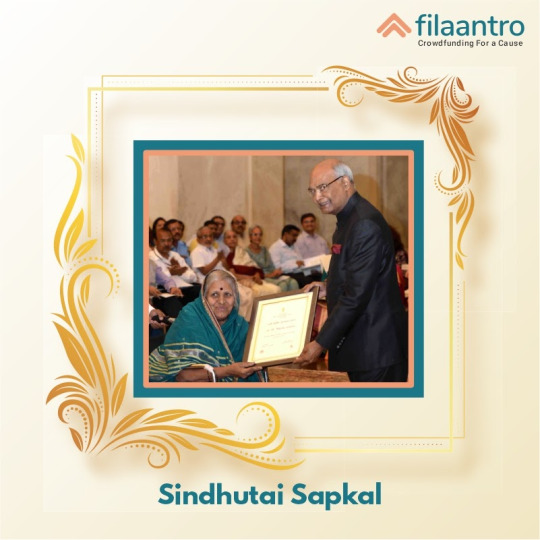
Sindhutai was born on 14 November 1948 in a cattle-grazing family in Maharashtra Wardha district. Being an unwanted child, she was referred to as Chindhi. Sapkal devoted herself to the orphans. She is fondly called "Mai", which means "mother" by the people around her. She has nurtured over 1,500 orphaned children under her care. She has a grand family of 382 sons-in-law, 49 daughters-in-law, and over a thousand grandchildren. Many of the children whom she had adopted are now well-educated lawyers and doctors. Some of her adopted children - including her biological daughter - are running their independent orphanages. She has been honoured with more than 900 National and International awards for her commitment, dedication and work. She used the grant money to buy land to make a home for her orphaned children. Apart from being a caring soul, she was also a good speaker and her hunger made her speak, she recites motivational lines for society and youth.
Sudha Hari Narayan Singh

Sudha Singh (born 25 June 1986) is an Indian Olympic athlete in the 3000 metres steeplechase event. A national record holder in the event, she has represented India at international events since 2005. Singh is an Asian Champion in the discipline and has won two gold and four silver medals at varying editions of the Asian Games and the continental championships.
P. Subramanian

Subramanian was the Founder-promoter of Shanthi Gears, a leading Gear Manufacturer located in Coimbatore, Tamilnadu. He is fondly remembered as the “Gear-man of Coimbatore. Padma Shri (posthumous) awardee P Subramanian, founder of Shanthi Gears, is remembered for offering quality food at a low price through his charitable trust Shanthi Social Services at Singanallur. His zeal for entrepreneurship and social service won him the affection of the masses. The 79-year-old industrialist, fondly called the ‘gearman of Coimbatore’, was an alumnus of PSG Polytechnic. He joined PSG Polytechnic as a lecturer in the late 1960s. Even while working as a lecturer, he started a workshop to pursue his interest in machines. That proved to be the foundation for Shanthi Gears in 1972.
New initiative of Indian government to recognise the achievements of common citizens nominated by any individual. India posses alot of talents which are either unrecognised, untapped or struggling to perform due to lack of efforts. In this modern era where technology has touched the lives of common man, there is a lot of scope to support such talents through crowdfunding platforms like Filaantro.
Crowdfunding is a means of raising money with the help of a large number of people and usually these people are public or individuals who can donate, invest in projects, causes or help towards something or someone in need.
Read more to understand: https://filaantro.org/blog/index.php/post/understanding-crowdfunding/48
0 notes
Text
Padma Shri Awards: Ordinary people being recognised for their life’s work
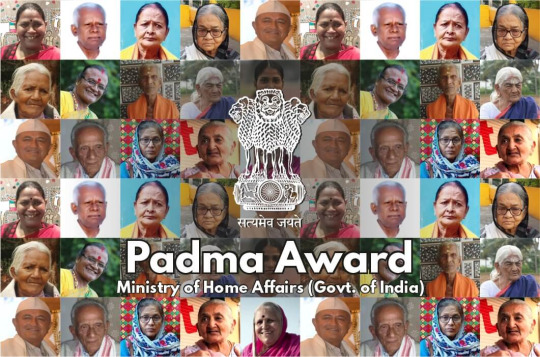
Padma Shri, also spelt Padma Shree, is one of the highest civilian awards of the Republic of India, after the Bharat Ratna. It is awarded by the Government of India every year on India's Republic Day. Padma Awards were established in 1954 to be awarded to citizens of India in honour of their distinguished contribution in various provinces of activity including the arts, education, industry, literature, science, sports, medicine, social service and public affairs. It has also been awarded to some outstanding individuals who were not citizens of India but did contribute in different ways to India.
The selection criteria have been scrutinised in some quarters with the claim that many highly worthy artists have been left out to favour certain individuals. India has now built an online nomination platform for the common citizens to recommend the nomination for the annually given civilian "Padma" awards. As of 2021, 3225 people have received the award. Among the Padma Awardees this year, some very ordinary people that have inspired us with their great accomplishments have made a positive change in society and have contributed to society. Here is a mention of a few of those. This list does not, in any manner, consider the achievements of others inferior.
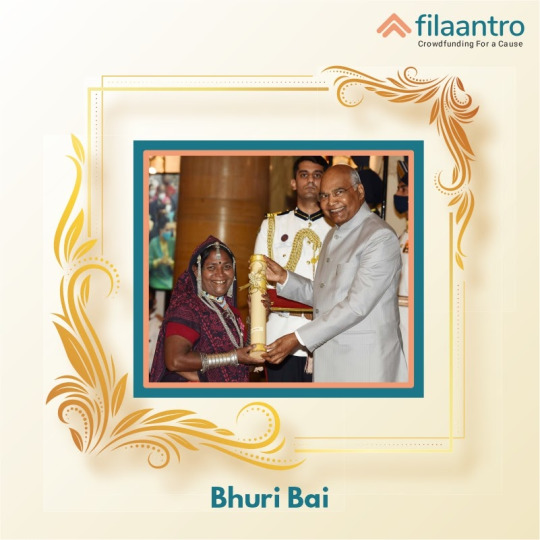
Bhuri Bai
Bhuri Bai of Zher came to Bhopal twenty years ago. She works at Indira Gandhi Rashtriya Manav Sangrahalaya IGRMS on a daily wage basis. She has been painting with acrylic on canvas for the past nine years and has already authenticated herself as a Bhil contemporary artist. The walls of the Museum of Mankind are covered with Bhuri Bai’s paintings. As a child, she would go to the haat or local fair, an essential part of Bhill life, where the colours inspired her to paint. She paints the laugh and fun of the Gad Bapsi festival, where young men try to scale an oiled pole to get the coconuts tied to its top.
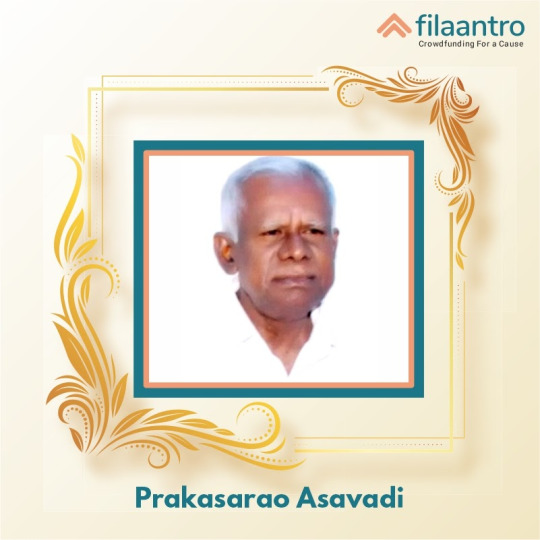
Asavadi Prakasarao
Dr Asavadi Prakasa Rao is a famous poet, Avadhani, writer, critic and translator besides being an academic, who had served as Principal of Govt. Degree Colleges; Member, Executive Committee, AP Sahitya Akademi; and Member, Executive Council, SK University. As Ashtavadhani, he gave 170 performances and has authored 50 books across various genres. And 18 books, including a doctoral thesis, have come out on his learned output. A distinguished orator, he took part in some radio/ TV programmes. He is also into social service. He has received several honours in his life work.
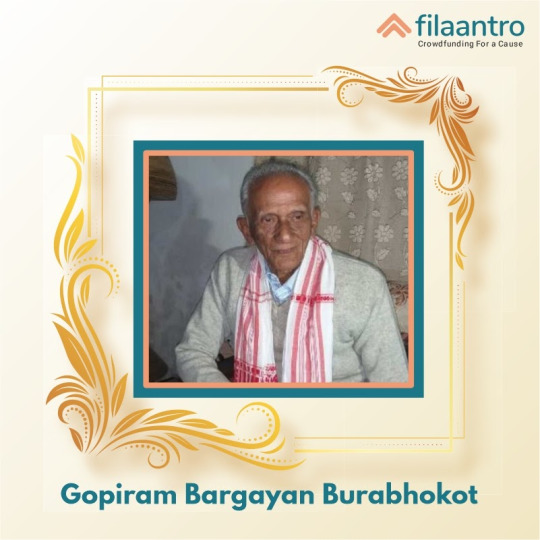
Gopiram Bargayan Burabhakat
Veteran Assamese folk musician from Majuli, Shri Gopiram Bargayan Burabhakat will be conferred with Padma Shri this year. He is known for refining the Sattriya traditional music for over 7 decades.
He has been awarded the prestigious Padma Shri award for his contribution to Art.
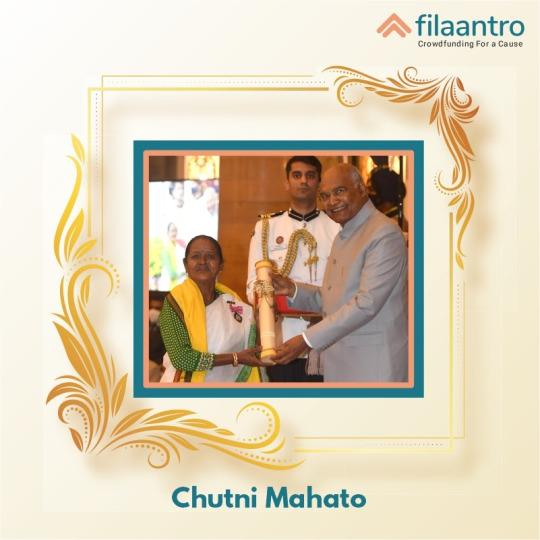
Chutni Mahato
Chutni Mahato, also known as Chutni Devi (b. 1959), is a social worker from Jharkhand, India. Once a victim of witch-branding, she now strives to help others who have been branded as witches and spreads awareness about superstitions and witchcraft.
Mahato was born in Bholadih village, Jharkhand in 1959. Married off as a child, she was labelled a witch in 1995 after a family member fell ill. The villagers grabbed her property, ill-treated her including sexual abuse, forcing her to drink urine and being displayed semi-naked. She ran away, finding her way back to her parent's house.
An Indian Administrative Service officer connected her to social workers who were working in the area of prevention of witch-hunting. Following this, for over two decades, she has taken up the cause against superstitious practices and beliefs in Jharkhand.
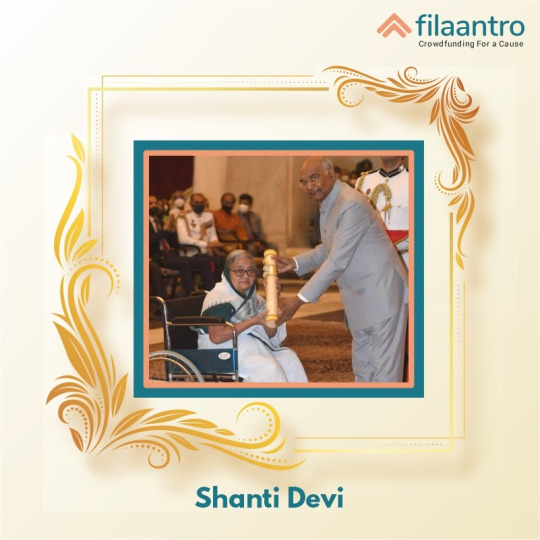
Shanti Devi
Shanti Devi is famous for her contribution towards restoring peace in the Maoist affected areas in Odisha. She leads the voluntary organisation Seva Samaj, who was born in the Balasore district on April 18, 1934. She got married at the age of 17 to Mahatma Gandhi follower Dr Ratan Das. After marriage, she shifted to Koraput from Balasore. Later, she founded an ashram at Gobarapalli in the Rayagada district. Her carrier in social work began from there. She worked for the growth and education of tribal girls. She also started multiple ashrams for the education, recovery and vocational training of orphans and destitute children. She wanted to make all girls self-sufficient so that they can live with self-respect in society.
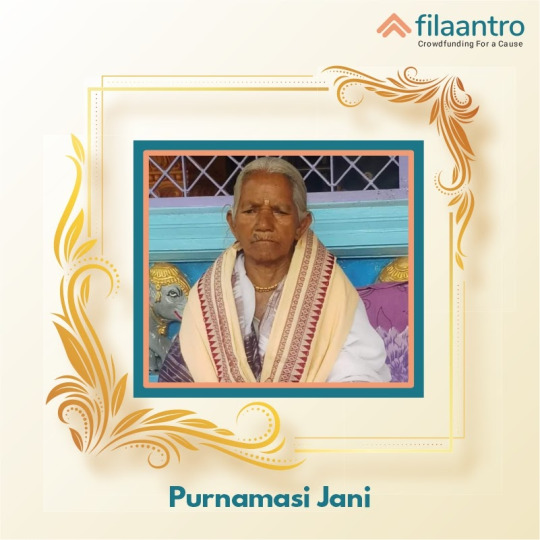
Purnamasi Jani
Purnamasi Jani, a Kui poet from Odisha. She is among the 5 Odias who have been recognised for their services. A tribal poet, Jani is popularly known as Tadi Sarubai in the region for her devotional songs and poems which she sings in the Kui dialect. In the last 40 years, Jani has written and sung thousands of devotional and folk songs. She has never been to school not does know how to read and write, other than reciting poems in the Kui dialect. Locals see her as a healer, whose songs are balm to the soul.
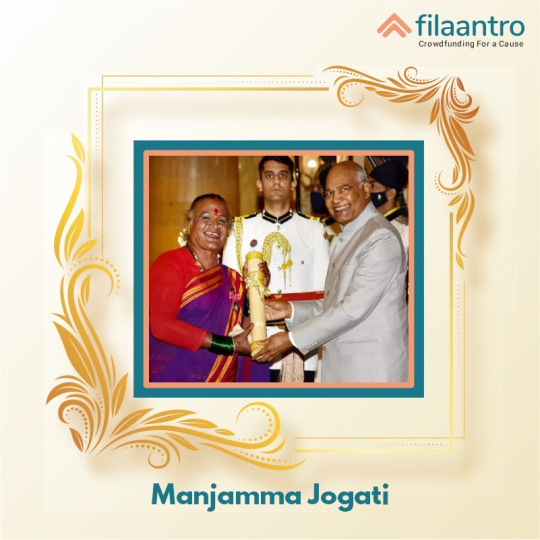
Manjamma Jogati
Manjamma Jogathi is an Indian Kannada theatre actress, singer and dancer of Jogathi Nritya, a folk dance form of North Karnataka. In 2019, she became the first transwoman to be the president of Karnataka Janapada Academy, a state top institution for folk arts. After leaving her house aged 15, she identified herself as a woman. Having completed education only till Class 10, she resorted to begging. During this time, she was sexually abused. Later, a father and son duo introduced her to dancing and took her to dance teacher Kallava Jogathi, where she learnt the Jogathi dance.
Manjamma became a permanent dancer in Kallavva's Jogathi dance group, performing in different parts of India.

Lajwanti
Patiala-based Phulkari artist Lajwanti (64), who has been doing the artwork since she was six. “My family brought the art to India while migrating from Multan, Pakistan, during Partition. I learnt it from my grandmother out of interest,” she said.
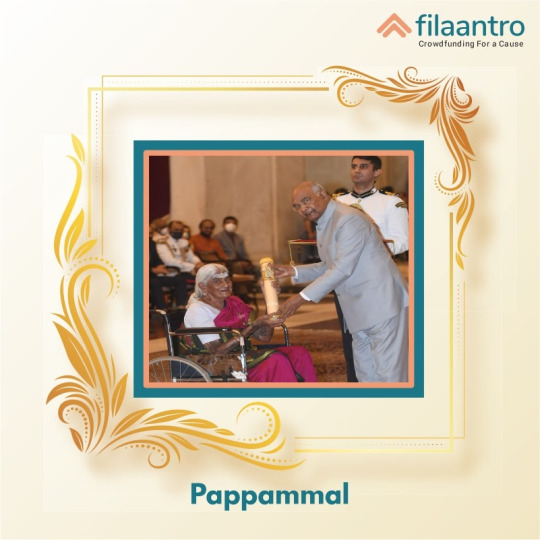
Pappammal
M. Pappammal alias Rangammal was born to Velammal and Maruthachala Mudaliar in the village of Devarayapuram in 1914. She lost her parents at a young age, and she and her two sisters were raised in Thekkampatti, Coimbatore by their paternal grandmother.
She is an organic farmer from Tamil Nadu, India. At the age of 105, she is argued to be the oldest farmer still active in the field. She is regarded as a pioneer in the agriculture field and is affiliated with Tamil Nadu Agricultural University's department of education. At her age, she works every day on her 2.5 acres of land.
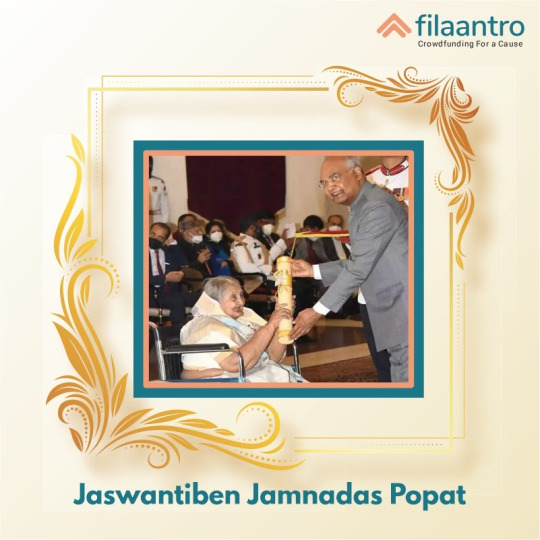
Jaswantiben Jamnadas Popat
Jaswantiben Jamnadas Popat is an Indian businesswoman, who is one of the founders of Shri Mahila Griha Udyog Lijjat Papad, a women's worker cooperative involved in manufacturing various fast-moving consumer goods. She started the company with a seed capital of ?80 (US$1.10), their cooperative venture - the Shri Mahila Griha Udyog Lijjat Papad and now has a turnover of over ?1,600 crores (US$212 million). Her organization has employed nearly 45,000 women. While most people may not recognise her by name, it is unlikely that you are unfamiliar with her product. If you are someone who watched television during the 90s.
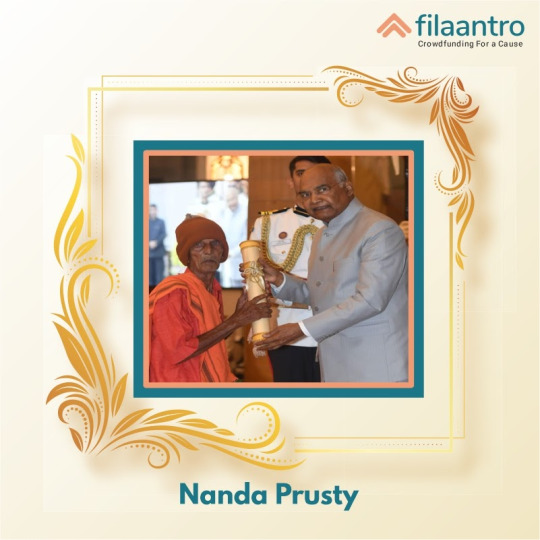
Nanda Prusty
102-yr-old 'Nanda sir', who provided free education to children and adults at Jajpur, Odisha for decades, raised his hands in a gesture of blessing the President," the official account of the President's office tweeted while sharing photos from the awards ceremony, which took place Monday at the Rashtrapati Bhavan. Fondly known as 'Nanda Sir', he has spent several decades of his life providing free education to children and adults in Jajpur in Odisha. Having only been able to study till Class 7 owing to his family's financial condition, he has been teaching children free of cost since Independence to eradicate illiteracy in his village.
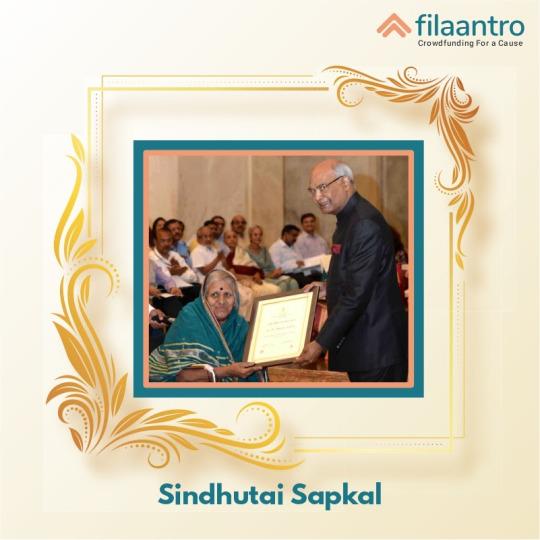
Sindhutai Sapkal
Sindhutai was born on 14 November 1948 in a cattle-grazing family in Maharashtra Wardha district. Being an unwanted child, she was referred to as Chindhi. Sapkal devoted herself to the orphans. She is fondly called "Mai", which means "mother" by the people around her. She has nurtured over 1,500 orphaned children under her care. She has a grand family of 382 sons-in-law, 49 daughters-in-law, and over a thousand grandchildren. Many of the children whom she had adopted are now well-educated lawyers and doctors. Some of her adopted children - including her biological daughter - are running their independent orphanages. She has been honoured with more than 900 National and International awards for her commitment, dedication and work. She used the grant money to buy land to make a home for her orphaned children. Apart from being a caring soul, she was also a good speaker and her hunger made her speak, she recites motivational lines for society and youth.

Sudha Hari Narayan Singh
Sudha Singh (born 25 June 1986) is an Indian Olympic athlete in the 3000 metres steeplechase event. A national record holder in the event, she has represented India at international events since 2005. Singh is an Asian Champion in the discipline and has won two gold and four silver medals at varying editions of the Asian Games and the continental championships.
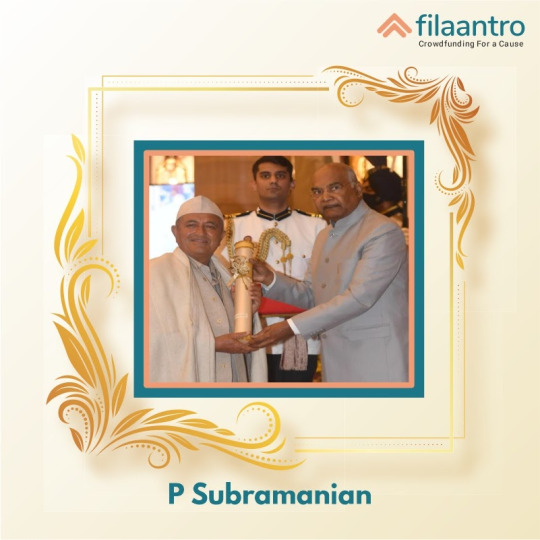
P. Subramanian
Subramanian was the Founder-promoter of Shanthi Gears, a leading Gear Manufacturer located in Coimbatore, Tamilnadu. He is fondly remembered as the “Gear-man of Coimbatore. Padma Shri (posthumous) awardee P Subramanian, founder of Shanthi Gears, is remembered for offering quality food at a low price through his charitable trust Shanthi Social Services at Singanallur. His zeal for entrepreneurship and social service won him the affection of the masses. The 79-year-old industrialist, fondly called the ‘gearman of Coimbatore’, was an alumnus of PSG Polytechnic. He joined PSG Polytechnic as a lecturer in the late 1960s. Even while working as a lecturer, he started a workshop to pursue his interest in machines. That proved to be the foundation for Shanthi Gears in 1972.
New initiative of Indian government to recognise the achievements of common citizens nominated by any individual. India posses alot of talents which are either unrecognised, untapped or struggling to perform due to lack of efforts. In this modern era where technology has touched the lives of common man, there is a lot of scope to support such talents through crowdfunding platforms like Filaantro.
Crowdfunding is a means of raising money with the help of a large number of people and usually these people are public or individuals who can donate, invest in projects, causes or help towards something or someone in need.
Read more to understand: https://filaantro.org/blog/index.php/post/understanding-crowdfunding/48
Author : Lubdha Dhanopia
0 notes
Text
The Indian honours system is the system of awards given to individuals for a variety of services to the Republic of India. The categories of awards are as follows -
Civilian Awards
Bharat Ratna
The Bharat Ratna,[1] the highest civilian award of the country, was instituted in the year 1954. Any person without distinction of race, occupation, position, gender or religion is eligible for this award. It is awarded in recognition of exceptional service/performance of the highest order in any field of human endeavour. On conferment of the award, the recipient receives a Sanad (certificate) signed by the President and a medallion. It is not mandatory that this award should be given every year.
Padma awards
Padma Awards[2] were instituted in the year 1954. Except for brief interruptions during the years 1977 to 1980 and 1993 to 1997, these awards have been announced every year on Republic Day. The award is given in three categories, viz. Padma Vibhushan, Padma Bhushan and Padma Shri, in the decreasing order of importance.
Padma Vibhushan for "exceptional and distinguished service". Padma Vibhushan is the second-highest civilian award in India.
Padma Bhushan for "distinguished service of a high order". Padma Bhushan is the third-highest civilian award in India .
Padma Shri is awarded for "distinguished service". Padma Shri is the fourth-highest civilian award in India.
While national honours, the Padma awards do not include cash allowances, benefits, or special concessions in rail/air travel.[3] Per a December 1995 judgment of the Supreme Court of India, no titles or honorifics are associated with the Bharat Ratna or any of the Padma awards; honorees cannot use them or their initials as suffixes, prefixes or pre- and post-nominals attached to the awardee’s name. This includes any such use on letterheads, invitation cards, posters, books etc. In the case of any misuse, the awardee will forfeit the award, and he or she is cautioned against any such misuse upon receiving the honour.[4]
The decoration comprises a sanad (Certificate) issued under the hand and seal of the President and a Medallion.
The recipients are also given a replica of the medallion, which they can wear during any ceremonial/State functions etc., if they desire.
A commemorative brochure giving out brief details in respect of each award winner is also released on the day of the investiture ceremony.
Selection process
These awards seek to recognize work of any distinction ...... and is given for distinguished and exceptional achievements/service in all fields of activities/disciplines, such as art, literature and education, sports, medicine, social work, science and engineering, public affairs, civil service, trade and industry, etc. All persons without distinction of race, occupation, position or sex are eligible for these awards.
In 2015, the BJP government decided to end the practice of ministers recommending names for Padma awards and replaced it with any Indian citizen recommending a person for Padma awards online. The government said that this was done with the belief that every citizen has something to contribute to the nation and that contribution should be integrated with the country's growth. Accordingly, several hitherto unknown citizens were awarded Padma awards in 2017. The role of the state governments was also minimised.[5][6][7]
Annulment of awards
While there are no specific criteria for withdrawing a Padma award, the President of India, per the awards' statutes, may cancel and annul any award in the case of any misconduct committed by the recipient. At least three awards of the Padma Shri have been so annulled, twice in 1958 for recipients residing in the state of Punjab and once in 1974 for a recipient residing in the state of Gujarat.[8]
Military Awards
Main article: Awards and decorations of the Indian Armed Forces
Wartime gallantry awards
Param Vir Chakra — Highest military award, equivalent to the Victoria Cross (which was replaced once India gained its independence).
Maha Vir Chakra – Maha Vir Chakra is the second highest military decoration in India and is awarded for acts of conspicuous gallantry in the presence of the enemy, whether on land, at sea or in the air.
Vir Chakra – Third in precedence in the awards for wartime gallantry.
Peacetime gallantry awards
Ashoka Chakra – An Indian military decoration awarded for valour, courageous action or self-sacrifice away from the battlefield. It is the peacetime equivalent of the Param Vir Chakra.
Kirti Chakra – Second in order of precedence of peacetime gallantry awards.
Shaurya Chakra – Third in order of precedence of peacetime gallantry awards.
Wartime/Peacetime service awards
Sena Medal / Nau Sena Medal / Vayu Sena Medal
Wartime Distinguished Service
Sarvottam Yudh Seva Medal
Uttam Yudh Seva Medal
Yudh Seva Medal
Peacetime Distinguished Service
Param Vishisht Seva Medal
Ati Vishisht Seva Medal
Vishisht Seva Medal
National awards
Women
Nari Shakti Puraskar
Children
National Child Award for Exceptional Achievement
National Bal Shree Honour
Literature awards
Jnanpith Award is the highest literary honour Award in Literature of India
Sahitya Akademi Award
Sahitya Akademi Fellowship
Saraswati Samman
Bhasha Samman
Translation Awards
Anand Coomarswamy Fellowships
Premchand Fellowship
Particular awards
National sports awards
Rajiv Gandhi Khel Ratna
Dronacharya award
Arjuna award
Dhyan Chand Award
C.K. Nayudu Award
Police awards
President's Police Medal for Gallantry
President's Fire Services Medal for Gallantry
President's Correctional Service Medal for Gallantry
President's Home Guards and Civil Defence Medal for Gallantry
Police Medal for Gallantry
Fire Services Medal for Gallantry
Correctional Service Medal for Gallantry
Home Guards and Civil Defence Medal for Gallantry
President's Police Medal for Distinguished Service
President's Fire Services Medal for Distinguished Service
President's Correctional Service Medal for Distinguished Service
President's Home Guards and Civil Defence for Distinguished Service
Police Medal for Meritorious Service
Fire Services Medal for Meritorious Service
Correction Service Medal for Meritorious Service
Home Guards and Civil Defence Medal for Meritorious Service
President Tatrakshak Medal
Bravery awards
National Bravery Award
Bharat Award
Sanjay Chopra Award
Geeta Chopra Award
Kritin Bhardwaj Award
Jeevan Raksha Padak Series of Awards
Sarvottam Jeevan Raksha Padak
Uttam Jeevan Raksha Padak
Jeevan Raksha Padak
0 notes